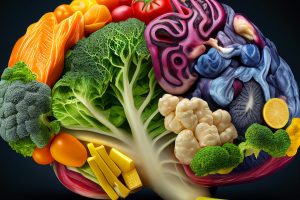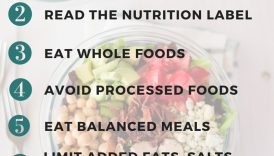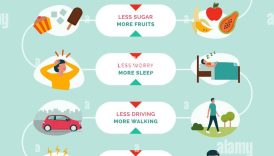Exploring the Connection Between Nutrition and Mental Well-being

Importance of Nutrition
Nutrition plays a pivotal role in our overall health, serving as the foundation for physical and mental well-being. What we eat directly impacts not only our energy levels but also our mood and cognitive functioning. Imagine starting your day with a balanced breakfast—perhaps a bowl of oatmeal topped with fresh fruits. This simple meal helps fuel your body, setting a positive tone for the day. Key benefits of good nutrition include:
- Exploring the Connection Between Nutrition and Mental Well-being
- Importance of Nutrition
- Significance of Mental Well-being
- The Gut-Brain Axis
- Understanding the Gut-Brain Connection
- Impact of Nutrition on Gut Health
- Nutrients for Mental Health
- Omega-3 Fatty Acids
- Vitamin D and its Effects on Mood
- Role of Microbiota in Mental Well-being
- Gut Microbiota Diversity
- Probiotics and Mental Health
- Foods That Boost Mood and Cognitive Function
- Dark Leafy Greens
- Berries and Antioxidants
- Effects of Sugar and Processed Foods on Mental Health
- Sugar's Impact on Mood
- Risks of High Processed Food Consumption
- Lifestyle Factors Affecting Nutrition and Mental Well-being
- Beyond what we eat, lifestyle factors significantly affect our nutrition and mental well-being. One crucial element is sleep quality. Poor sleep can lead to increased stress and anxiety, further complicating our nutritional choices. Think back to a night of tossing and turning—did you find yourself reaching for sugary snacks the next day to stay awake? It’s a common pattern! Quality sleep helps regulate hormones that affect appetite, mood, and overall cognitive function. Here are some effects of sleep quality on mental health:Emotional Resilience: Better sleep enhances your ability to cope with stress.Cognitive Sharpness: Adequate rest supports memory retention and concentration.Balanced Mood: Consistent sleep patterns can stabilize mood swings and reduce irritability.
- Exercise and its Benefits on Cognitive Function
- The Connection Between Diet Patterns and Mental Disorders
- Mediterranean Diet and Depression
- Importance of Balanced Nutrition for Anxiety Management
- Improved Energy Levels: Nutritious foods provide sustained energy, helping you stay active and alert.
- Enhanced Immune Function: A well-rounded diet strengthens your immune system, reducing the risk of illness.
- Weight Management: Eating nutrient-dense foods aids in maintaining a healthy weight.
Significance of Mental Well-being
Just as nutrition is essential for physical health, it is equally critical for mental well-being. Research shows a strong link between what we eat and how we feel. For example, individuals who consume a diet rich in fruits, vegetables, and whole grains often report lower levels of stress and anxiety. Mental health matters, influencing our ability to think clearly, relate to others, and deal with life’s challenges. Fostering a positive mindset through nutrition can lead to:
- Reduced Anxiety and Stress: A balanced diet stabilizes blood sugar levels and enhances mood.
- Better Cognitive Function: Nutrients support brain health, improving memory and concentration.
By prioritizing nutrition, everyone can take significant steps toward a healthier and happier life.
The Gut-Brain Axis
Understanding the Gut-Brain Connection
Now that we appreciate the importance of nutrition and its impact on mental well-being, let’s dive into an intriguing relationship—the gut-brain axis. This connection represents a two-way communication pathway between the gut and the brain, highlighting how our digestive health can influence how we think, feel, and act. Personal experiences often illustrate this connection. For instance, have you ever felt nervous before a big presentation and noticed a flutter in your stomach? This is a tangible representation of the gut-brain communication in action! Research indicates that around 90% of serotonin, often referred to as the “feel-good” neurotransmitter, is produced in the gut. Therefore, a healthy gut could lead to improved mood and cognitive function.
Impact of Nutrition on Gut Health
Nutrition significantly impacts our gut health, shaping the balance of beneficial bacteria in our microbiome. Incorporating a variety of whole foods can promote a thriving gut environment. Here are some ways nutrition affects gut health:
- Fiber-Rich Foods: Fruits, vegetables, and whole grains nourish beneficial gut bacteria.
- Fermented Foods: Yogurt, kefir, and sauerkraut introduce probiotics, enhancing gut flora diversity.
- Hydration: Drinking plenty of water aids digestion and supports an optimal gut environment.
By understanding this vital gut-brain connection, individuals can take proactive steps in their nutrition for the sake of both gut and mental health.
Nutrients for Mental Health
Omega-3 Fatty Acids
As we explore the specific nutrients that significantly impact mental health, let’s start with omega-3 fatty acids. These essential fats, found primarily in fatty fish like salmon, walnuts, and flaxseeds, are not only beneficial for heart health but also crucial for brain function. They are known to support neurotransmitter activity and reduce inflammation, both of which are vital for a healthy mind. Have you ever noticed how eating a hearty bowl of salmon and avocado salad made you feel rejuvenated? That’s the power of omega-3s! Some studies suggest that regular consumption of these fatty acids is linked to lower rates of depression and anxiety. Key sources include:
- Fatty fish (salmon, mackerel)
- Walnuts
- Chia seeds
- Flaxseeds
Vitamin D and its Effects on Mood
Another nutrient worth mentioning is vitamin D, often called the “sunshine vitamin.” Vitamin D is not only important for bone health but also plays a significant role in mood regulation. Many individuals, particularly in areas with limited sunlight, may experience vitamin D deficiency, which has been linked to feelings of sadness and low energy. Getting outside for a brisk walk on sunny days can enhance your vitamin D levels. Foods that can help include:
- Fatty fish
- Eggs
- Fortified dairy products
Incorporating these nutrients into your diet can create a solid foundation for enhancing mental health and emotional resilience.
Role of Microbiota in Mental Well-being
Gut Microbiota Diversity
Continuing our discussion on factors influencing mental health, let’s take a closer look at the role of microbiota in mental well-being. Our gut is home to trillions of bacteria, known collectively as the gut microbiota. A diverse microbiota is essential for optimal health, as it contributes to digestion, immune function, and even mental health. Picture your gut as a bustling city, with various species of bacteria playing different roles. A diverse and balanced community can produce neurotransmitters that influence mood and cognitive function. For example, a diet rich in fiber from fruits, vegetables, and whole grains can encourage this diversity, leading to positive outcomes for mental well-being.
Probiotics and Mental Health
Another exciting aspect of gut microbiota is the role of probiotics. These live microorganisms, often found in fermented foods like yogurt, kimchi, and kombucha, can help maintain a healthy gut. Some studies have shown that probiotics may alleviate symptoms of anxiety and depression. Including probiotics in your diet can be as simple as:
- Enjoying a serving of yogurt for breakfast.
- Adding sauerkraut to your sandwich.
- Sipping on kombucha as a refreshing drink.
By nurturing a balanced microbiota, individuals can potentially harness the power of their gut to fortify their mental health and emotional resilience.
Foods That Boost Mood and Cognitive Function
Dark Leafy Greens
Now that we understand how microbiota influence mental well-being, let’s explore specific foods that can enhance mood and cognitive function. One standout category is dark leafy greens. Foods like spinach, kale, and Swiss chard are not only nutrient-dense but also packed with vitamins and minerals crucial for brain health. For instance, these greens are rich in folate, a B-vitamin linked to improved mood and reduced risk of depression. Have you ever made a vibrant kale salad, topped with avocado and nuts? That meal not only nourishes your body but also serves as a boost for mental clarity! Consider adding dark leafy greens to your meals:
- Blend spinach into smoothies for a nutrient-packed breakfast.
- Create a kale salad with your favorite toppings for a satisfying lunch.
- Sauté Swiss chard with garlic as a delicious side dish.
Berries and Antioxidants
Another fantastic food group to consider is berries. Blueberries, strawberries, and blackberries are rich in antioxidants, which protect the brain from oxidative stress. Research suggests that these little powerhouses can improve communication between brain cells, ultimately enhancing cognitive function. Imagine starting your day with a bowl of mixed berries—what a tasty, vibrant way to support your mental health! Here are some easy ways to incorporate berries into your diet:
- Add them to yogurt or oatmeal for a nutritious breakfast.
- Blend into smoothies for a refreshing drink.
- Snack on them throughout the day for a sweet treat.
By incorporating dark leafy greens and berries into your diet, you can take significant strides toward boosting your mood and cognitive function, making each day a bit brighter.
Effects of Sugar and Processed Foods on Mental Health
Sugar’s Impact on Mood
As we embrace healthy foods that elevate our mood, it’s also crucial to be aware of the potential downsides of sugar. While sugary treats may provide a temporary energy spike and a sense of satisfaction, they can lead to mood swings and fatigue shortly after. This rollercoaster effect can create a feeling of irritability and anxiety. Think about that chocolate bar you grabbed during a mid-afternoon slump—while it may have felt good for a moment, the crash afterward often leaves one feeling drained. Here’s how sugar can impact mood:
- Mood Swings: Rapid spikes and drops in blood sugar can lead to irritability.
- Increased Anxiety: Sugar can exacerbate feelings of stress and anxiety over time.
- Fatigue: After the initial energy boost, the crash can result in tiredness.
Risks of High Processed Food Consumption
In addition to sugar, the consumption of highly processed foods presents risks for mental health. These foods often contain unhealthy fats, sugar, and additives that can negatively affect mood and cognitive function. Research indicates that diets high in processed foods may increase the risk of mental health disorders. Here are some common issues linked to processed food consumption:
- Inflammation: Processed foods can contribute to chronic inflammation, which is associated with depression and anxiety.
- Nutrient Deficiency: These foods often lack essential nutrients critical for brain health.
- Altered Gut Microbiota: High processed food diets can disrupt the gut microbiome balance, impacting mental well-being.
By being mindful of sugar and processed food intake, individuals can make significant strides towards improving their mental health, fostering a more stable mood and clearer thinking.
Lifestyle Factors Affecting Nutrition and Mental Well-being
Beyond what we eat, lifestyle factors significantly affect our nutrition and mental well-being. One crucial element is sleep quality. Poor sleep can lead to increased stress and anxiety, further complicating our nutritional choices. Think back to a night of tossing and turning—did you find yourself reaching for sugary snacks the next day to stay awake? It’s a common pattern! Quality sleep helps regulate hormones that affect appetite, mood, and overall cognitive function. Here are some effects of sleep quality on mental health:
- Emotional Resilience: Better sleep enhances your ability to cope with stress.
- Cognitive Sharpness: Adequate rest supports memory retention and concentration.
- Balanced Mood: Consistent sleep patterns can stabilize mood swings and reduce irritability.
Exercise and its Benefits on Cognitive Function
Another key lifestyle factor is regular exercise. Engaging in physical activity has profound benefits on both mental health and cognitive function. When you exercise, your body releases endorphins, often referred to as “feel-good” hormones, which can help alleviate feelings of stress and anxiety. Consider incorporating activities you enjoy, such as:
- Walking or jogging: Simple and effective for boosting mood.
- Yoga: Great for stress relief and mindfulness.
- Group classes: Provides social interaction along with physical activity.
The combination of quality sleep and regular exercise lays a robust foundation for improved nutrition and mental well-being, empowering individuals to lead healthier and happier lives.
The Connection Between Diet Patterns and Mental Disorders
Mediterranean Diet and Depression
As we consider how lifestyle choices shape our mental health, it becomes increasingly evident that specific diet patterns play a crucial role in managing mental disorders. The Mediterranean diet, rich in fruits, vegetables, whole grains, fish, and healthy fats, has garnered attention for its potential benefits against depression. Research suggests that this diet not only nourishes the body but also supports brain health and mood regulation. Picture enjoying a dish of grilled salmon drizzled with olive oil, served with a side of quinoa and roasted vegetables. This delicious meal is not just satisfying; it’s also linked to better mood stability and lower depression rates. Key components of the Mediterranean diet include:
- Healthy Fats: Sources like olive oil are packed with omega-3s.
- Antioxidant-Rich Foods: Berries and leafy greens help combat oxidative stress.
- Whole Grains: These provide sustained energy and stabilize blood sugar levels.
Importance of Balanced Nutrition for Anxiety Management
In addition to the Mediterranean diet, maintaining balanced nutrition is vital for effective anxiety management. A well-rounded diet that includes adequate vitamins and minerals can help regulate stress levels and improve emotional resilience. Here are some essential nutrients to consider for managing anxiety:
- Magnesium: Found in nuts, seeds, and green leafy vegetables, it helps relax nerves and muscles.
- B Vitamins: Essential for energy production and neurotransmitter function; sources include whole grains and legumes.
- Zinc: Present in meat, shellfish, and legumes, it has been linked to improved mood and stress reduction.
By understanding the connection between diet patterns and mental health, individuals can make informed dietary choices that support their emotional well-being, paving the way for a healthier, more fulfilling life.





